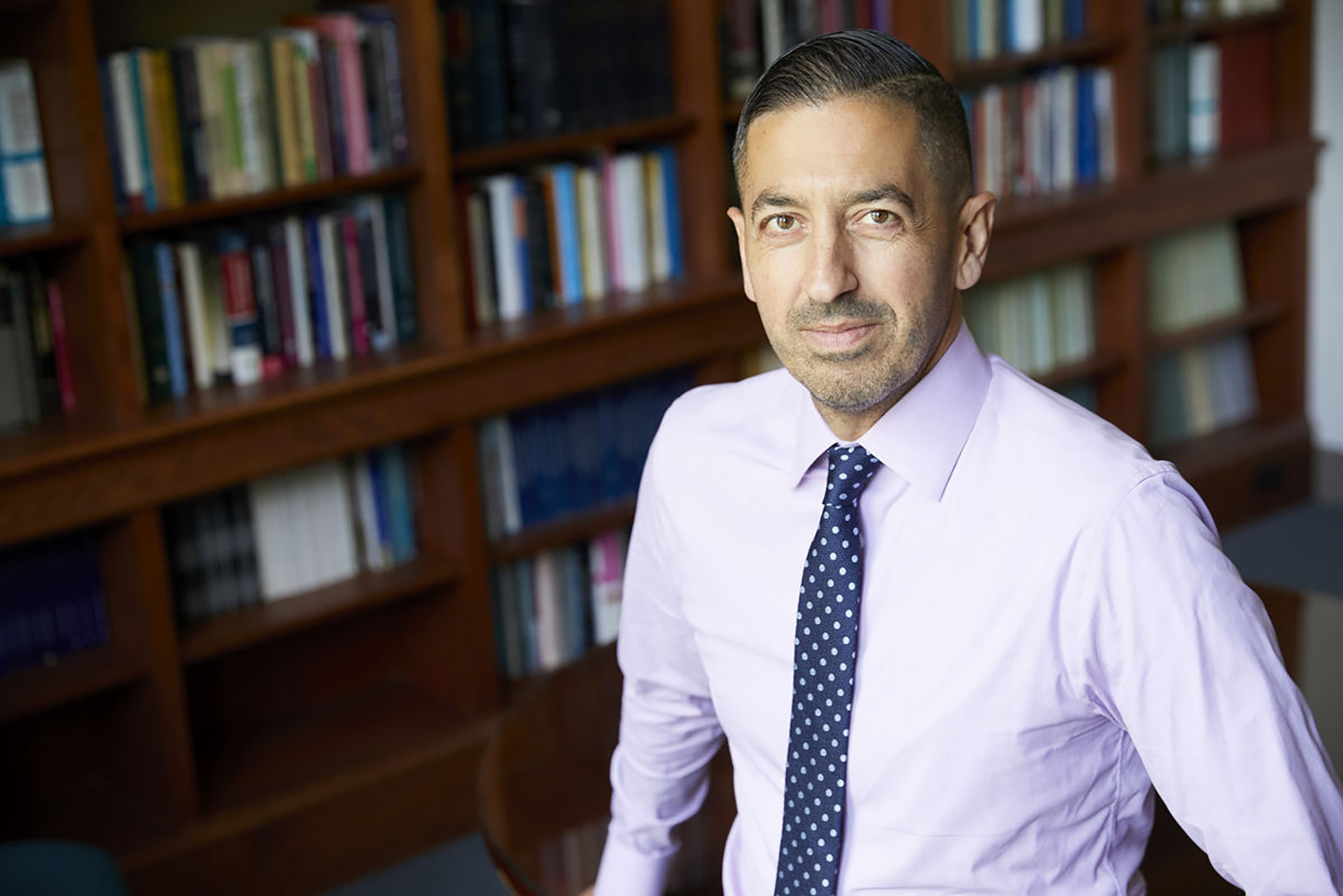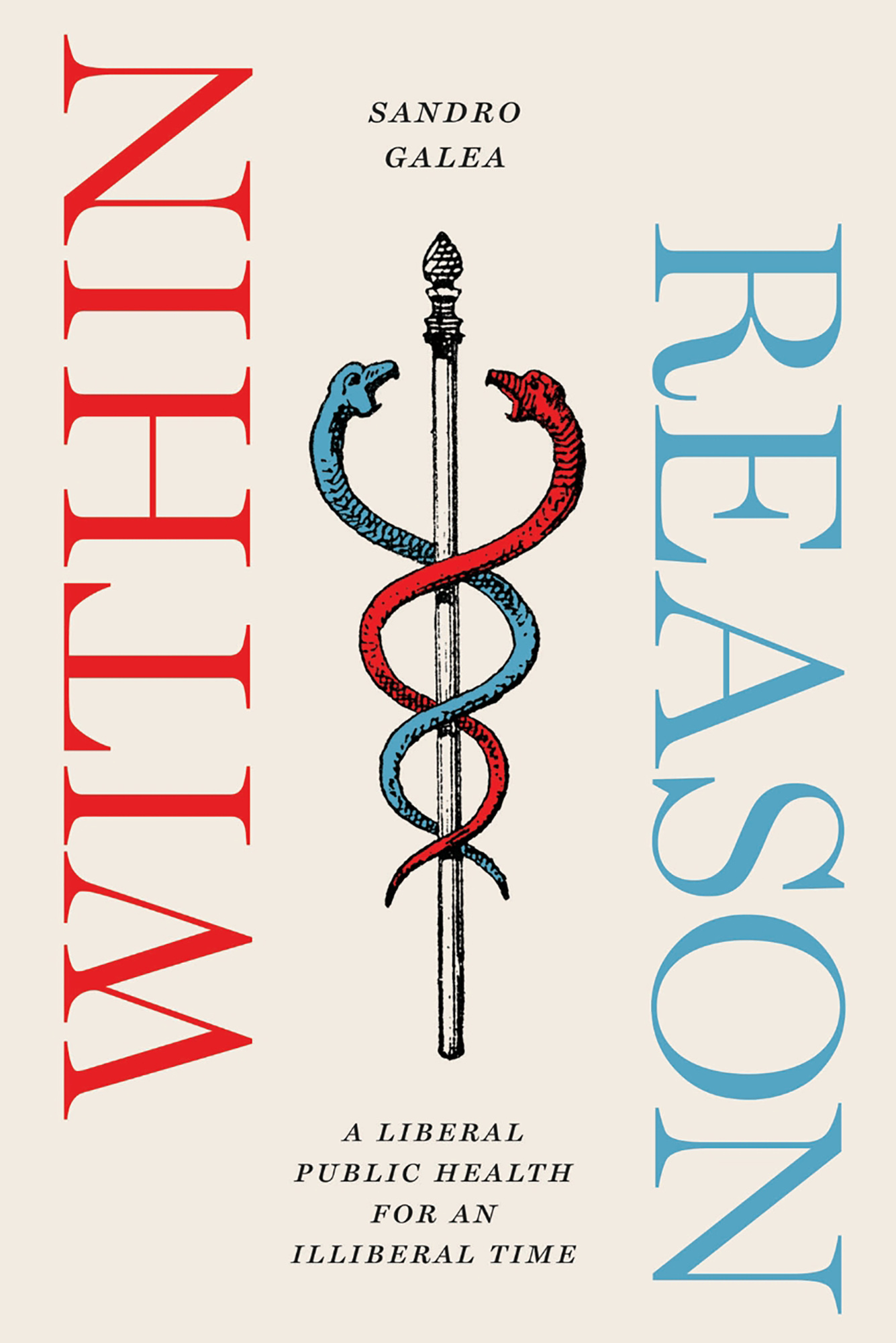Lessons for Public Health from the Pandemic
In his new book, Within Reason: A Liberal Public Health for an Illiberal Time, SPH Dean Sandro Galea calls for more debate, less certainty

Sandro Galea says looking back at the COVID response, “I felt a real responsibility to tackle these issues” in his new book. Photo by Kelly Davidson
Lessons for Public Health from the Pandemic
In his new book, Within Reason: A Liberal Public Health for an Illiberal Time, SPH Dean Sandro Galea calls for more debate, less certainty
“Believe the science” was a message sounded again and again from the public health community during the COVID pandemic—but, of course, not everyone did. Politicians and conspiracy theorists did their best to undermine that belief in support of their own agendas, and too many Americans fell under their sway. Others simply couldn’t abide mask mandates, social distancing, and other restrictions on their lives.
Sandro Galea, dean and Robert A. Knox Professor at Boston University School of Public Health, says it wasn’t just the fault of bad faith arguments from politicians and vaccine “skeptics.” Public health also suffered from a crisis of liberalism, retreating from the principles of free speech and open debate.

In his new book, Within Reason: A Liberal Public Health for an Illiberal Time (University of Chicago Press, 2023), aimed at the public health community, Galea doesn’t focus on anti-science propaganda, but on how better communication and better decision-making from the public health community can help science persevere or regain public trust.
The book consists of 50 essays with titles ranging from “UFOs, COVID-19, and the Return of Radical Uncertainty” to “The Consent of the Governed,” and from “Decision-Making in an Age of Social Media” to “The Role of Experts and Community Voices Both.”
“While this has at times made it easier for misinformation to spread,” Galea writes in the chapter focused on social media, “I believe this democratizing remains a positive influence by letting ever-greater numbers of people engage with the important conversations of our time.”
And if all that seems counterintuitive, coming from a prominent voice for health equity, he even kinda, sorta says something positive about right-wing podcaster Joe Rogan (gulp!).
“For somebody who in the past several years has had the privilege of being in a position to write about public health, I felt a real responsibility to tackle these issues,” says Galea, a physician and epidemiologist. “I almost felt like I would be dishonest if I did not.”
BU Today spoke with Galea about his impetus for writing the book and the challenges he lays out for the public health community moving forward.
Q&A
with Sando Galea
BU Today: I have to confess I found some of your arguments in this book a little saltier than those in your previous books.
Galea: I’m glad. It is a saltier book. I thought long and hard about writing this and about when we published it. It was by design that it was published in December of 2023, because I wanted to produce this book at a time when we were ready to listen to some of the ideas in it. I’m very conscious of the fact that a number of the things that I challenge in the book were actions and behaviors that emerged from a time when everybody felt under duress. So, I wanted to wait until we were out from under the crush of acute COVID before getting these ideas out in the world.
BU Today: So, your goal here is to…
Galea: My goal is to challenge us to do better. There’s no way to convey these ideas without challenging some of the habits of mind and action that have become modal. And perhaps the highest praise I’ve received about this book has been from several people who have reached out to me to say, “I’m glad you wrote this book and I disagree with most of what you said.”
BU Today: Do better how?
Galea: Part of the intent of the book is to push us to be able to disagree without being disagreeable, to have respect, to recognize that priorities for Joel may be different from priorities for Sandro and to recognize that that’s not necessarily a bad thing. The all-too-rapid acceptance of the scientific orthodoxy and all-too-rapid acceptance of a certitude that turns out to be false—that gets us into trouble and loses people’s trust in us.
A Pew Research Center survey on trust in scientists and government and health that just came out shows an enormous drop in trust in public health and in the good intentions of science—and I think that is really problematic for us.
I lead the book with the example of the Brookline bakery having the sign on the door during COVID that says, “Health experts say X, but we disagree.” And I challenge the reader: Can you think of any time before COVID when a bakery would say that? And that to me shows a real loss of confidence in public health. I felt a real responsibility to tackle these issues.
BU Today: I want to ask about a particular sentence from the book: “Notwithstanding the polarization that kept a vocal faction of the public at odds with the advice of health authorities, we are in a moment when public health is more influential than it’s ever been.” Given the polarization and the pushback, is it really more influential than ever?
Well, a lot of our students say, “Well, I sort of stumbled into public health and my parents don’t know what public health is.” “I was doing this other career, then I discovered public health.” All that’s changed. Public health has become something that everybody talks about. Everybody knows what public health is. And that I think extends our influence. Now influence doesn’t necessarily mean that one is going to get one’s way, but it does give one an influence.
BU Today: But that polarization. You talk a lot in this book about good faith dialogue, but isn’t most of the pushback, most of the polarization, coming from bad faith actors?
I do make reference in that sentence correctly to people who have seen it as an explicit part of what they want to do—to reject public health. I don’t have much patience for it, to be honest. I want to be clear about this, and hopefully it was clear from the book. I think there are bad faith actors, and I think they’re a minority, and I don’t really tackle them in the book. I’m not exonerating politicians who made a lot of missteps. It’s just not what I’m writing about.
But my assumption—which I have been challenged on, and I still think I’m right—is that most people, most of the time, would rather act in good faith. All things being equal. And that means that our job is to bring the great middle along with us as much as possible. And part of my argument is that too readily adopting rigid orthodoxies that are not aware of realities reduces our ability to do that.
BU Today: Can you give me an example?
Francis Collins, former head of the National Institutes of Health, said in a recent interview that, in retrospect, we were too narrowly focused on COVID and we ignored economic function and social function. And he’s right. We did. The point I make in the book is you don’t live to be healthy. You want to be healthy so you can live.
Public health forgot that in a time of COVID, where we said all that matters is that we’re healthy. All that matters is that we reduce COVID transmission. And if my mother is dying in a hospital, I cannot give her a hug because the worst thing that could be is that I’m gonna get COVID from her. But that’s not the worst thing. The worst thing is that I can’t give my mother a hug. And when we took actions like removing people’s ability to be with their loved ones, when people who were in nursing homes were essentially imprisoned in their apartments out of fear for them getting COVID, we forgot that health is a means to an end, and the end is living with dignity, having the autonomy to make your own choices. And that was a mistake.
There is no more challenging phrase than “follow the science,” because that suggests there’s a straight line from the science to policy, and that’s simply wrong. Policymaking needs to balance multiple inputs, science being one of them. But science is not the only input. I mean, if science were the only input, all speed limits would be under 25 miles per hour. Right? If science was the only input, there would be no cigarettes and no cigars in existence. But it’s not the only input. People derive pleasure from these things and we’re trying to balance that out.
BU Today: You are not calling for accountability for past mistakes, though?
It is a forward-looking, not backward-looking book. There is no finger-pointing in it. I never once say person X does something wrong. I intentionally wrote the book to look ahead. My goal is to challenge us to do better.
BU Today: You’ve written a lot previously about the underlying causes of health inequality. The raw feelings and conflict of the last few years do seem to have brought some of these issues a little more into the open.
I think so. Underlying structural racism and inequities and those things are now part of public conversation in a way they never have been, and I think that’s good. That gives me hope.
Comments & Discussion
Boston University moderates comments to facilitate an informed, substantive, civil conversation. Abusive, profane, self-promotional, misleading, incoherent or off-topic comments will be rejected. Moderators are staffed during regular business hours (EST) and can only accept comments written in English. Statistics or facts must include a citation or a link to the citation.